UMs meet to discuss gun sense
By Melissa Lauber
UMConnection Staff
Related Information
Gun Sense Resources for Local Churches
Information from Church Mutual Insurance about Safety and Security
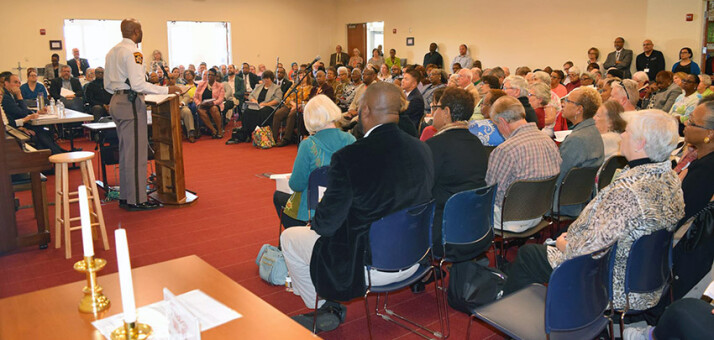
When the Critical Conversation on Gun Sense was starting at the Baltimore-Washington Conference Mission Center at 1 p.m. on Oct. 17, the Rev. Kay Albury was receiving news that Howard University was on lock-down. There were reports of an active shooter on campus, where her daughter, the Rev. Alexis Brown, serves as
The drama and fear of that situation illuminated some of the deep emotions surrounding guns that inspired Bishop LaTrelle Easterling to call together United Methodists for a conversation. Her call hit a nerve: the event was standing room only.
“We used every chair in the Mission Center,” said Sanjeev Christopher, the conference’s coordinator of radical hospitality.
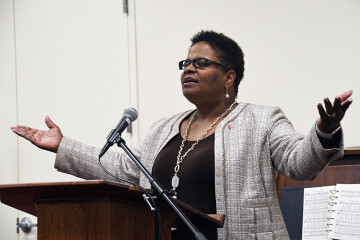 The bishop shared how, when she was writing a response to the recent mass shooting in Las Vegas, she found herself growing weary of the horror. “The word that kept coming to me,” she said, “was ‘again. Did this really happen – again?’”
The bishop shared how, when she was writing a response to the recent mass shooting in Las Vegas, she found herself growing weary of the horror. “The word that kept coming to me,” she said, “was ‘again. Did this really happen – again?’”
The Pulse nightclub in Orlando. Emanuel AME Church in Charleston, South Carolina. Virginia Tech. Sandy Hook Elementary School in Connecticut. These are just some of the high-profile tragedies that have been seared into the American conscience. But in the first six months of 2017 alone, there had been 154 mass shootings in the US, and these shootings accounted for just 1 percent of gun violence in America.
Yet even when events become overwhelming or make us weary, Christians are called to act, the bishop said. She reminded those present to never devalue the power and practical witness of prayer and celebrated that social holiness is one of the foundations of United Methodism.
“Our intent is to acknowledge our pain, frustration, fear
Some pastors in the meeting raised concerns that their congregations do not appreciate when their pastors “preach politics” and address social issues from the pulpit.
“As your episcopal servant leader, I have an expectation that our clergy
“If you are preaching Jesus – Jesus crucified and resurrected and all that that means – and some of your members leave, or you have trouble paying apportionments, it’s alright with me,” Easterling said to a standing ovation.
The bishop welcomed four conversation partners to lead the discussion on gun sense: the Rev. Susan Henry-Crowe, General Secretary of the General Board of Church and Society; the Rev. Mark Schaefer, chaplain of American University; Major Sheree Biscoe, commander of the Baltimore Police Department’s Western District; and Sheriff Troy Berry of Charles County.
The panel, led by the Rev. Rodney Smothers, the conference Director of Leadership and Congregational Development, spoke about guns from their personal perspectives and then responded to questions from the 220 clergy and lay people in attendance.
‘So that we may walk in God’s path’
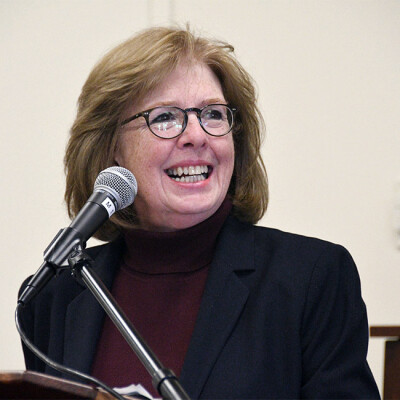 Henry-Crowe shared the United Methodist perspective on gun violence. In front of the Methodist Building in Washington, D.C., she said, is a sign that says we are praying for the victims of the Las Vegas shooting. “But not only must we pray,
Henry-Crowe shared the United Methodist perspective on gun violence. In front of the Methodist Building in Washington, D.C., she said, is a sign that says we are praying for the victims of the Las Vegas shooting. “But not only must we pray,
Henry-Crowe acknowledged that there are many perspectives in this conversation.
“We even come today with many different ways of not knowing what to,” she said.
The United Methodist stance on ending gun violence, she stressed, is nuanced. It is outlined in Resolution 3428 of the denomination’s 2016 Book of Resolutions and “draws on Micah’s inspiration, applying Micah’s prophetic dreams of peace to violent realities.”
United Methodists assert that God deplores violence and that Jesus calls us to be peacemakers. Guns make violence deadlier and more frequent, Henry-Crowe said. Domestic violence turns deadlier when guns are involved, and firearms are the most common method of suicide in countries where guns are prevalent.
Not every gun, or every kind of gun, is addressed in the resolution, she stressed.
“United Methodists define small arms to include assault rifles, submachine guns, light machine guns, grenade launchers, portable anti-aircraft guns
She called on United Methodists to engage in study and educate themselves and others about gun violence; to advocate and organize to address this issue nationally, internationally and in your local context; and to care for your community and the world.
Fear, faith and guns
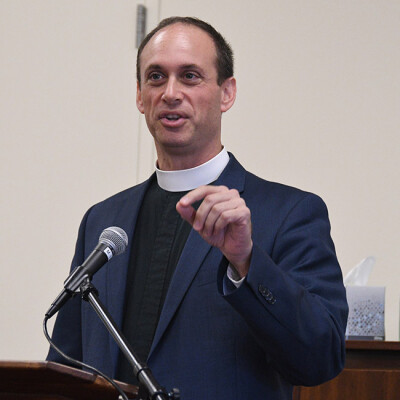 While Scripture does not make explicit reference of firearms, said the Rev. Mark Schaefer, it does have plenty to say about violence. There are some 407 verses in which swords are mentioned.
While Scripture does not make explicit reference of firearms, said the Rev. Mark Schaefer, it does have plenty to say about violence. There are some 407 verses in which swords are mentioned.
“There are certainly verses where God
“There’s something particular about the gun,” Schaefer said. “In the martial arts, by the time a person learns how to take another person’s life with their bare hands, they’ve received so much discipline and training that
In the US, at this point in our history, he pointed out, there are 112 guns for every 100 Americans. But
“Fear pervades our national life,” Schaefer said. “We’ve created a culture of fear. … We’re all scared, we’re feeling out of control and a firearm is an incredibly powerful tool that gives us the illusion of control; and so, we are tempted to turn to it because we want that security. The allure of that immediate, powerful and deadly tool is strong to us when we are feeling afraid.”
But in so doing we run a very real spiritual risk, said Schaefer. “It’s not the tool alone that’s the problem, but it’s the fear we have created. It’s the way we look
Unprecedented challenges
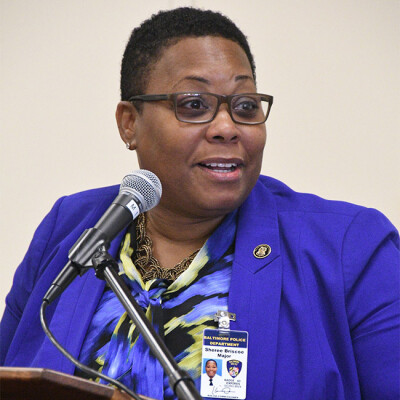 In 2017, as of Oct. 14, there were 540 non-fatal shooting in Baltimore; 101 of them happened in the Western District. This 28-square mile area, with 40,000 residents, was the home of the civil unrest after Freddie Grey died while in police custody in 2015.
In 2017, as of Oct. 14, there were 540 non-fatal shooting in Baltimore; 101 of them happened in the Western District. This 28-square mile area, with 40,000 residents, was the home of the civil unrest after Freddie Grey died while in police custody in 2015.
Just after that time, Major Sheree Briscoe was brought in to be commander of the Western District. A United Methodist, she brings a faith perspective to her insights from 23 years on the police force.
“The reality is that every day, urban cities are seeing an unprecedented rate of violence,” she said. How the faith community grapples with people’s right and desire to bear arms with that unprecedented violence can be an interesting struggle, said Briscoe.
Coming to terms with that struggle means understanding that crime is really a “byproduct of an ill community,” she said. The church needs to also be in conversation about mental health as it relates to guns and other issues. It needs to wrestle with the interconnectedness of all the challenges stemming from socio-economic conditions, she said, and the disenfranchisement of youth and the expectations and realities facing law enforcement officials.
There is a robust system in place for monitoring police officers’
She encouraged church leaders to join in partnerships with community organizations.
“Partnerships are everything,” Briscoe said. “Why reinvent the wheel? We need to do more collectively to partner and creating sustainable programming.”
The Baltimore Police Department has several programs in which pastors and
“We are all required to take the Word of God out to the people of God,” Briscoe said. “I wear a uniform to do this.”
What vision is being cast?
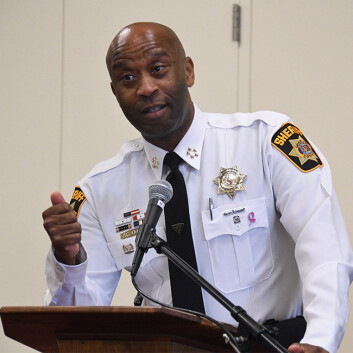 Sheriff Troy Berry of Charles County, who also serves on a state commission to look at best practices in law enforcement, warned United Methodists about getting caught up in a singular issue. Too often, people want to isolate an issue and their tunnel vision leads to inaction, he said.
Sheriff Troy Berry of Charles County, who also serves on a state commission to look at best practices in law enforcement, warned United Methodists about getting caught up in a singular issue. Too often, people want to isolate an issue and their tunnel vision leads to inaction, he said.
Berry stressed the need for those present to challenge their elected officials to express the vision they are casting to spark a dialogue about gun violence and other substantial issues.
He also hopes United Methodists will advocate for common sense legislation, like the bill that came before Maryland legislators last year that would require toy guns to look markedly different than real guns.
“We need to champion these bills,” he said. “These toys guns are being used in actual crimes. … Why does a toy have to look like the real thing?”
In his 25 years in law enforcement, including time as a homicide investigator, Berry has come to believe that gun ownership is a privilege, not a right.
“People who have mental health issues or a propensity toward domestic violence shouldn’t have guns,” he said. “I’ve seen a lot of people who use guns for wrong reasons. That’s where the conversation starts.”
Taking aim at the violence
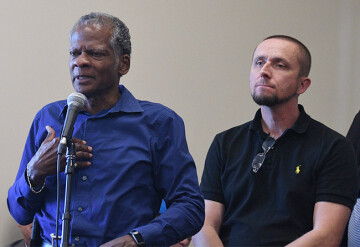 As the panel of speakers concluded their remarks, people rose to ask questions and discuss how guns and gun violence might be addressed, particularly in areas where it is hitting very close to home. For example, on the day before the Critical Conversation on gun sense, there was a shooting just blocks away from Sharp Street Memorial UMC in Baltimore. The day after, the Revs. Tiffany Patterson and Brenda Lewis led a vigil for five people shot, three of whom were killed, at a shooting in Edgewood.
As the panel of speakers concluded their remarks, people rose to ask questions and discuss how guns and gun violence might be addressed, particularly in areas where it is hitting very close to home. For example, on the day before the Critical Conversation on gun sense, there was a shooting just blocks away from Sharp Street Memorial UMC in Baltimore. The day after, the Revs. Tiffany Patterson and Brenda Lewis led a vigil for five people shot, three of whom were killed, at a shooting in Edgewood.
Some spoke about youth and ministering to them around this issue. One after another, they came to the microphones to speak about advocating for legislation, how to best have controversial conversations, the
The conversation was lively as people explored how to create a culture in which people feel free again to borrow a cup of sugar from their
“What’s so interesting to me is that when Jesus encounters people, he heals them, he feeds them, he sits with them, he doesn’t preach about what they need to believe in order to get into heaven. He’s actually meeting
As the conversation ended, the
The conversation, Bishop Easterling said, will continue. “There are many topics worthy of deep, engaging, critical conversation.”

